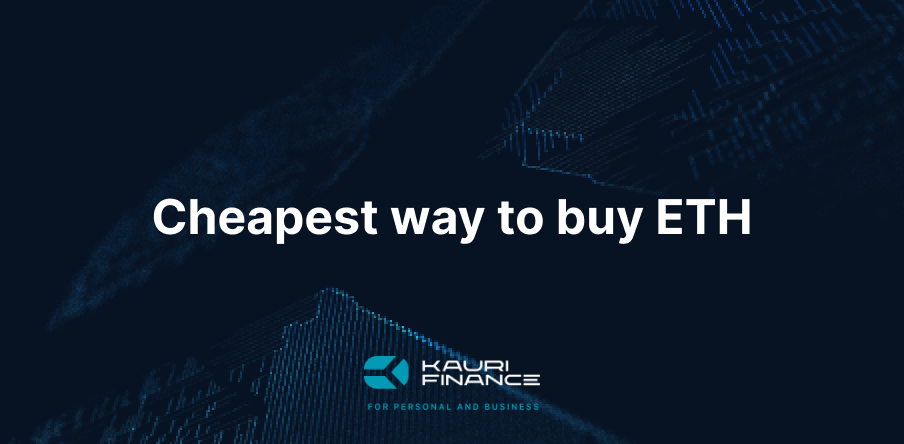
The Cheapest Way to Buy Ethereum: A Comprehensive Guide
- Understanding Ethereum and Its Investment Potential
- Factors Affecting the Cost of Buying Ethereum
- Top 5 Cheapest Methods to Buy Ethereum
- 1. Low-Fee Cryptocurrency Exchanges
- 2. Peer-to-Peer (P2P) Platforms
- 3. Dollar-Cost Averaging (DCA) Strategy
- 4. Utilizing Stablecoins for Purchases
- 5. Cashback and Reward Programs
- Comparing the Cheapest Methods: Pros and Cons
- Frequently Asked Questions About Buying Ethereum Cheaply
- What is the minimum amount of Ethereum I can buy?
- Are there any risks associated with buying Ethereum through P2P platforms?
- How does the volatility of Ethereum affect the cost of purchasing?
- Can I buy Ethereum directly with fiat currency?
- What are the tax implications of buying Ethereum?
- How can I ensure the security of my Ethereum purchases?

Discover how to navigate crypto exchanges, peer-to-peer networks, and DeFi ecosystems to your advantage. Unlock the secrets of frugal Ethereum acquisition and position yourself at the forefront of the digital asset revolution.
As we delve into the intricacies of Ethereum's investment potential, let's first explore the fundamental factors that influence its value in the market.
Understanding Ethereum and Its Investment Potential
Ethereum, brainchild of Vitalik Buterin, has revolutionized the cryptocurrency landscape since its inception. Unlike Bitcoin, Ethereum's blockchain serves as a versatile platform for decentralized applications, smart contracts, and tokenization. This multifaceted utility has catapulted Ethereum to the forefront of blockchain innovation, cementing its position as the second-largest cryptocurrency by market capitalization. Investors are drawn to Ethereum for its potential to reshape industries beyond finance. Its key features and advantages include:
-
Programmable blockchain enabling complex, self-executing smart contracts
-
Thriving ecosystem of DApps and DeFi protocols, with over $43 billion in total value locked
-
Ongoing scalability improvements, including the transition to a more energy-efficient proof-of-stake mechanism
-
Strong developer community and institutional backing, fostering continuous innovation
-
Potential for significant value appreciation as adoption grows across various sectors
Now that we understand Ethereum's potential, let's examine the various factors that can affect the cost of acquiring this promising cryptocurrency.
Factors Affecting the Cost of Buying Ethereum
Navigating the Ethereum market demands a nuanced understanding of its multifaceted cost landscape. Exchange fees, often overlooked, can significantly impact your bottom line. These fees vary widely, with some platforms charging up to 3.99% per transaction, while others offer rates as low as 0.1%. Payment methods also play a crucial role; credit card purchases typically incur higher fees compared to bank transfers. Market volatility, a hallmark of cryptocurrencies, can cause price fluctuations of up to 15.7% within a single month, as observed in recent Ethereum trends.
|
Factor |
Impact on Cost |
Variation Range |
Example |
|
Exchange Fees |
High |
0.1% - 3.99% |
Coinbase Pro: 0.5% |
|
Payment Method |
Moderate |
0% - 5% additional |
Credit Card: 3.99% |
|
Market Volatility |
Variable |
Up to 15.7% monthly |
Dec 2023: $2,300 - $2,660 |
|
Liquidity |
Low to Moderate |
0.1% - 2% slippage |
$100K trade: ~$1K slippage |
Liquidity, often underestimated, can lead to slippage, particularly for large volume trades. As Ethereum's price climbs, this factor becomes increasingly relevant. Regulatory changes and technological advancements, such as the EIP-4844 upgrade, also influence acquisition costs indirectly by affecting market dynamics and transaction efficiency.
With a clear understanding of the factors influencing Ethereum's cost, let's explore the most cost-effective methods to purchase this digital asset.
Top 5 Cheapest Methods to Buy Ethereum
Discover five ingenious methods to acquire Ethereum cost-effectively. From cutting-edge exchanges to community-driven platforms, these strategies redefine frugal crypto investing. Prepare to revolutionize your ETH purchasing approach as we explore low-fee cryptocurrency exchanges, a popular choice among savvy investors.
1. Low-Fee Cryptocurrency Exchanges
Savvy investors leverage low-fee cryptocurrency exchanges to maximize Ethereum purchases. Platforms like Binance and Kraken offer fees as low as 0.1% per trade, dwarfing the 3.99% charged by some competitors. These exchanges enable investors to capture more ETH per dollar through advanced order types and high liquidity.
To further reduce costs, seek platforms offering fee discounts for high-volume trading or holding native tokens. Some even provide fee-free trading periods, allowing strategic purchase timing. The difference between a 0.1% and 0.5% fee can significantly impact your investment growth.
In crypto's volatile landscape, every fraction counts. Low-fee exchanges aren't just cost-savers; they're gateways to maximizing Ethereum exposure. It's the difference between spectating and participating in the digital asset revolution.
While exchanges offer convenience, peer-to-peer platforms present another cost-effective option for purchasing Ethereum.
2. Peer-to-Peer (P2P) Platforms
Peer-to-peer (P2P) platforms offer a unique approach to acquiring Ethereum, connecting buyers directly with sellers. LocalCryptos, for instance, boasts an average fee of just 0.25%, undercutting many centralized exchanges. These decentralized marketplaces provide enhanced privacy and flexibility, allowing users to negotiate terms and payment methods.
The versatility of P2P platforms is particularly advantageous in regions with limited access to conventional crypto services. However, caution is crucial. While platforms implement escrow services to mitigate risks, users must exercise due diligence. Always verify seller reputation and adhere to platform guidelines to ensure secure transactions.
P2P platforms can be an excellent option, but for those looking to minimize risk and capitalize on market trends, let's explore the Dollar-Cost Averaging strategy.
3. Dollar-Cost Averaging (DCA) Strategy
Dollar-Cost Averaging (DCA) stands out as a powerful strategy for Ethereum investors aiming to navigate market volatility. By consistently purchasing a fixed dollar amount of ETH at regular intervals, investors can potentially lower their average cost basis over time. This approach capitalizes on Ethereum's long-term growth potential while sidestepping the pitfalls of market timing.
Consider an investor allocating $500 monthly to ETH purchases, potentially accumulating 4.76 ETH over a year at an average price of $1,260. This method not only smooths out short-term price fluctuations but also fosters disciplined investing habits. Platforms like Coinbase offer automated DCA features, streamlining the process for busy investors.
4. Utilizing Stablecoins for Purchases
Savvy investors have discovered a hidden gem in stablecoin intermediaries for Ethereum acquisition. By converting fiat to stablecoins like USDC or DAI, traders can sidestep hefty fees associated with direct ETH purchases. This two-step process, while counterintuitive, is a masterstroke in cost reduction.
Stablecoins buffer against Ethereum's price swings, allowing precise entry timing. Platforms like Curve Finance offer deep liquidity pools for minimal slippage. Some exchanges incentivize stablecoin usage with reduced fees, potentially slashing costs by up to 50% compared to direct fiat-to-ETH transactions.
This strategy not only cushions against volatility but also opens arbitrage opportunities across exchanges. As the crypto ecosystem evolves, stablecoins stand as pillars of stability, offering a prudent path to Ethereum acquisition.
Stablecoins can provide stability, but for those looking to maximize their Ethereum purchases, cashback and reward programs offer an innovative approach.
5. Cashback and Reward Programs
Maximize your Ethereum acquisitions through innovative cashback and reward programs. Crypto.com's Visa Card offers up to 8% cashback in CRO tokens, easily convertible to ETH. BlockFi's Bitcoin Rewards Credit Card allows instant rewards conversion to Ethereum, while Gemini's Credit Card provides direct ETH rewards up to 3% on dining purchases.
For a cutting-edge approach, explore Lolli's browser extension, partnering with over 1,000 retailers to offer Bitcoin rewards, convertible to ETH. Brave browser users can earn Basic Attention Tokens (BAT) for viewing privacy-respecting ads, creating another pathway to discounted Ethereum through strategic conversions.
With these cost-effective methods in mind, let's compare their pros and cons to help you make an informed decision on your Ethereum investment strategy.
Comparing the Cheapest Methods: Pros and Cons
Navigating the Ethereum acquisition landscape requires a nuanced understanding of each method's strengths and pitfalls. Let's dissect the five strategies we've explored, weighing their merits against potential drawbacks:
|
Method |
Pros |
Cons |
|
Low-Fee Exchanges |
Minimal costs (0.1-0.5%), high liquidity |
Centralized control, hack risks |
|
P2P Platforms |
Privacy, flexible payments, avg. 0.25% fee |
Longer transactions, counterparty risk |
|
DCA Strategy |
Mitigates volatility, automated investing |
May miss dips, requires discipline |
|
Stablecoin Intermediaries |
Reduced slippage (0.1-2%), arbitrage chances |
Extra conversion step, timing complexity |
|
Cashback Programs |
Passive ETH accumulation (up to 8%) |
Lower immediate yields, program reliance |
Each approach offers unique advantages, from cost-efficiency to volatility protection. However, investors must weigh these benefits against security risks and market timing challenges. The optimal strategy often involves a tailored combination, aligning with individual risk tolerance and investment goals.
Now that we've explored various strategies for purchasing Ethereum cost-effectively, let's address some common questions that investors often have about the process.
Frequently Asked Questions About Buying Ethereum Cheaply
What is the minimum amount of Ethereum I can buy?
The minimum Ethereum purchase varies by platform. Coinbase allows as little as $2 worth, while Binance supports 0.01 ETH. Some P2P markets offer even smaller amounts. Remember, transaction fees can significantly impact small purchases. Always consider the fee-to-investment ratio and your long-term investment strategy when buying minimal amounts.
Are there any risks associated with buying Ethereum through P2P platforms?
P2P Ethereum transactions involve risks like counterparty fraud and privacy breaches. While escrow services offer some protection, they're not infallible. Regulatory scrutiny adds another layer of concern. To minimize exposure, always verify seller reputation and strictly adhere to platform guidelines when engaging in P2P trades.
How does the volatility of Ethereum affect the cost of purchasing?
Ethereum's volatility is a double-edged sword in purchasing. Price dips offer opportunistic buy-ins, potentially yielding higher returns. However, sudden surges can inflate costs, catching buyers off-guard. Timing becomes crucial, with market fluctuations demanding vigilant monitoring and strategic execution. Understanding these dynamics is key to cost-effective Ethereum acquisition.
Can I buy Ethereum directly with fiat currency?
Direct Ethereum purchases with fiat are available on platforms like Coinbase and Kraken. Fees vary, reaching up to 3.99% per trade. Consider bank transfers or P2P platforms for lower costs. Understanding tax implications is crucial for responsible Ethereum investing. Let's explore this important aspect next.
What are the tax implications of buying Ethereum?
Ethereum purchases trigger taxable events, requiring meticulous record-keeping. The IRS classifies crypto as property, subject to capital gains tax. Holding periods influence rates: short-term faces higher taxes than long-term. Consult a tax professional for personalized guidance on crypto taxation complexities.
How can I ensure the security of my Ethereum purchases?
Safeguard your Ethereum with multi-layered security. Use hardware wallets like Ledger for offline storage. Enable two-factor authentication on exchanges and spread assets across wallets. Stay updated and alert to phishing threats. Your vigilance is the key to protecting your digital wealth.
